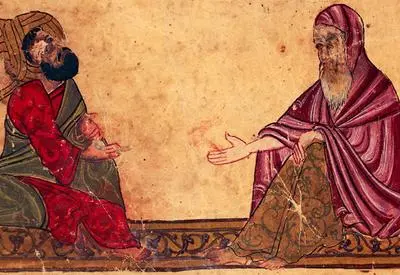There is, let us admit, something faintly comical about an academic field that cannot even decide what to call itself. It conjures up the sort of absurd scene that is so common in university life: the lengthy committee meeting devoted to working out what the committee’s remit should be, the tussle over the title of an endowed chair, the passionate debate waged over the placement of a comma. Yet serious intellectual disagreements can lie behind disputes over nomenclature. One such disagreement rages in my own field of speciality, which depending who you ask might be called “Arabic Philosophy” or “Islamic Philosophy.” Views on the question are so deeply held that when I co-edited the Cambridge Companion to Arabic Philosophy with Richard C. Taylor some years ago, one book review confined its remarks almost exclusively to complaining about the title.
This is ironic, since the beauty of the phrase “Arabic philosophy” should in theory be that it is so uncontentious. It would refer quite straightforwardly to philosophical texts written in the Arabic language. It does have a significant drawback, which is that people tend to misconstrue “Arabic” as a synonym for “Arab,” whereas in fact most philosophical writing in Arabic was not produced by Arabs. A famous exception is al-Kindī, tellingly dubbed “philosopher of the Arabs” already in medieval times, but at least as famous are al-Fārābī and Avicenna, two subsequent exponents of Aristotelian thought who wrote in Arabic but hailed from central Asia. Then too it may seem strange to define a field exclusively in terms of a language. This is not typical for other parts of the history of philosophy. Rather we tend to speak in terms of cultural developments (“Renaissance philosophy”) or, most often, plain old chronology (“ancient, medieval, early modern philosophy”). Or we reach for geographical boundaries: “Indian philosophy” is philosophy from India, written in many languages, and though “Chinese philosophy” could perhaps be a linguistic designation I take it to refer to philosophy from China, not philosophy written in Chinese.
Why then would you make an exception for “Arabic philosophy,” apart from conveying that people who work in this field need to master Arabic? The unspoken implication behind the phrase is that language is bound up with the very birth of this tradition, which, we are meant to understand, began when Greek philosophical works were translated into Arabic beginning in the 8th century AD. So when people object to this phrase, unless it is because they are taking “Arabic” to mean “Arab,” it will probably be because they object to the idea that everything philosophical in Islamic culture grew out of an engagement with Greek wisdom and its rendering into Arabic.
___
"The reason to speak of 'philosophy in the Islamic world' is to avoid ruling out topics of potential inquiry in advance, as if they are somebody else’s problem."
These critics are the partisans of “Islamic philosophy.” They want to emphasise the philosophical centrality and fecundity of Islam, to concede that even if many of the thinkers in question were reading Aristotle and other Greeks in Arabic translation, their abiding concern was with the message of the Quran. Fans of “Islamic philosophy” are likely to have a broader understanding of what scholars in the field should be reading: not only the works of Aristotelian thinkers like Avicenna and Averroes, but also writings by theologians and by mystics. Warming to their theme, they will point out that as Islamic history unfolds, more and more philosophical literature is produced in Persian instead of, or alongside, Arabic. Already Avicenna wrote an overview of his own philosophy in Persian in one work for the sake of a patron, and increasingly we see figures like like Suhrawardī, the founder of the “Illuminationist” tradition of philosophy: he wrote in both Arabic and in Persian, albeit that the Persian texts are full of Arabic words borrowed directly from Avicenna’s technical terminology. Thus the scholar who finds “Arabic philosophy” congenial is liable to specialise on thinkers of a relatively early period, from the time of the translation movement up to about the 12th century AD. Upholders of “Islamic philosophy” may well work on that period too, but are apt to be interested also in later developments, such as the thought of Suhrawardī or the period of the Safavid empire in Iran when philosophy was still being written in both Arabic and Persian. In the extreme cases, this camp may even go so far as to define their field as “Persian philosophy” or “philosophy in Persia,” and to suggest that Islamic philosophy was with very few exceptions undertaken by the residents of greater Persia.
 SUGGESTED READING
How to Cope With Loss: the Advice of Al-Kindi
By Peter Adamson
My own view is that both sides of the debate have a point, which is to say that both sides are at least partially wrong. As I’ve argued elsewhere, scholars in this field can find much of philosophical interest in Islamic theological debates, and in general ought to look beyond direct engagement with Greek philosophy in Arabic translation. So, to the extent that “Arabic philosophy” stands for a continuation of ancient philosophy now in Arabic rather than Greek or Latin, it is overly narrow in scope. Besides, even texts that do respond ultimately to a Hellenic thought were often composed in languages other than Arabic, notably Persian but also Syriac and Hebrew. It seems more than a little strange to define one’s field as including, say, Miskawayh’s Refinement of Ethics (a treatise on the ethical improvement of the soul, written in Arabic and full of material borrowed from Aristotle) but not al-Tusi’s Nasirean Ethics (a treatise not only on ethics but also politics and household management, written in Persian and full of material borrowed from Miskawayh). Another example would be Averroes’ famous commentaries on Aristotle, written in Arabic, which then received their own commentaries from Gersonides in Hebrew.
SUGGESTED READING
How to Cope With Loss: the Advice of Al-Kindi
By Peter Adamson
My own view is that both sides of the debate have a point, which is to say that both sides are at least partially wrong. As I’ve argued elsewhere, scholars in this field can find much of philosophical interest in Islamic theological debates, and in general ought to look beyond direct engagement with Greek philosophy in Arabic translation. So, to the extent that “Arabic philosophy” stands for a continuation of ancient philosophy now in Arabic rather than Greek or Latin, it is overly narrow in scope. Besides, even texts that do respond ultimately to a Hellenic thought were often composed in languages other than Arabic, notably Persian but also Syriac and Hebrew. It seems more than a little strange to define one’s field as including, say, Miskawayh’s Refinement of Ethics (a treatise on the ethical improvement of the soul, written in Arabic and full of material borrowed from Aristotle) but not al-Tusi’s Nasirean Ethics (a treatise not only on ethics but also politics and household management, written in Persian and full of material borrowed from Miskawayh). Another example would be Averroes’ famous commentaries on Aristotle, written in Arabic, which then received their own commentaries from Gersonides in Hebrew.
But as that last example shows, it is also too narrow to speak of “Islamic philosophy,” because so many of the relevant figures were Christians or Jews. In fact the men who translated Hellenic science from Greek into Arabic (sometimes by way of Syriac) were most often Christians who were often hired for the job by members of the Muslim elite. Then we have such phenomena as the so-called “Baghdad School” of Aristotelian philosophers, who anticipated Averroes’ project of writing commentaries on Aristotle: looking back to the example of late ancient commentators on his works, Averroes and the Baghdad school before him lavished great energies on explicating every sentence of key works like Aristotle’s Physics and his logical treatises. And, with the notable exception of al-Fārābī, the members of the Baghdad school were all Christians. As was Bar Hebraeus, who some centuries later drew on Avicenna and other, post-Avicennan thinkers, to write an encyclopaedic philosophical compendium in Syriac. It’s clearly a non-starter to describe such figures as “Islamic philosophers,” yet just as clearly these are figures who do belong to this branch of the history of philosophy.
It’s for this reason that I, and others in the field, have gravitated in recent years towards the wordier but less problematic phrase “philosophy in the Islamic world.” It’s a more capacious designation that, for me at least, deliberately means to include works written in Hebrew, Persian, and Syriac as well as Arabic, and to include figures who were Jewish and Christian as well as Muslim. The idea is that we are studying the philosophical output of a geographical and politically defined region, not of a language group or a single religion. Admittedly this proposal too can run afoul of exceptions. What should we say about thinkers who were working in places that fell alternately under Christian and Muslim rulership, like Antioch or Toledo? Especially when it comes to Jewish philosophy, the demarcation artificially includes thinkers working in the Iberian Peninsula before the “reconquest,” while in theory excluding those who lived in the same region thereafter or who migrated from Spain and Portugal to other parts of Latin Christendom. But nothing’s perfect. The problematic cases seem to be fewer here, and more importantly, the phrase gestures towards a spirit of inclusion rather than exclusion. The reason to speak of “philosophy in the Islamic world” is to avoid ruling out topics of potential inquiry in advance, as if they are somebody else’s problem. So that’s how I would suggest calming this particular tempest in a teapot. Now we can get on to more important things, like interpreting and translating as many texts as possible from across this broad tradition and, as we do so, getting the commas in the right places.

















Join the conversation